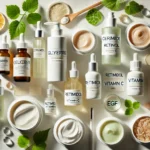
Achieving healthy, glowing skin isn’t just about the products you use—your diet plays a vital role, too. Recent research underscores how dietary habits influence skin conditions like acne, aging, and overall elasticity. In this article, we’ll dive into how your food choices can shape the health of your skin.
How Diet Affects Your Skin
Your skin, the largest organ in your body, reflects both your internal health and external environment. Nutrients from your diet provide the building blocks for skin cell repair and protection. Eating the right foods enhances hydration, reduces inflammation, and boosts collagen production—key factors for healthy skin.
On the flip side, poor dietary habits can accelerate aging, lead to breakouts, and worsen conditions like eczema or psoriasis.
Top Nutrients for Healthy Skin
Vitamin C: Found in citrus fruits, berries, and bell peppers, vitamin C helps produce collagen and shields skin from oxidative stress.
Omega-3 Fatty Acids: Found in fatty fish, walnuts, and flaxseeds, omega-3s fight inflammation and maintain your skin’s natural barrier.
Antioxidants: Foods like green tea, dark chocolate, and leafy greens combat free radicals, slowing down premature aging.
Zinc: Present in pumpkin seeds and shellfish, zinc controls oil production and aids in wound healing.
Water: Hydration is essential. Drinking enough water keeps your skin plump and supports detoxification.
Foods to Limit or Avoid
- High-Glycemic Foods: Sugary snacks and refined carbs can cause insulin spikes, leading to inflammation and acne.
- Dairy Products: Some studies link milk consumption to acne, possibly due to hormones in dairy.
- Processed and Fried Foods: High in unhealthy fats and additives, these can clog pores and accelerate aging.
Tips for a Skin-Friendly Diet
- Eat a Balanced Diet: Include plenty of fruits, vegetables, whole grains, lean proteins, and healthy fats.
- Emphasize Probiotics: Foods like yogurt, kimchi, and kombucha support gut health, which can improve skin clarity.
- Limit Alcohol and Caffeine: These can dehydrate your skin and impair its barrier function.
- Incorporate Turmeric: This spice has anti-inflammatory properties that can boost skin resilience.
Creating a Skin-Healthy Meal Plan
Breakfast: Greek yogurt topped with fresh berries and a drizzle of honey.
Lunch: Grilled salmon salad with spinach, avocado, and a lemon-olive oil dressing.
Snack: A handful of walnuts and a cup of green tea.
Dinner: Quinoa with roasted vegetables and turmeric-spiced chicken breast.
Hydration: Drink at least eight glasses of water daily. Add lemon or cucumber slices for a refreshing twist.
Addressing Common Skin Concerns Through Diet
Acne: Cut back on sugar and dairy while increasing your intake of zinc and omega-3s to reduce breakouts.
Dry Skin: Incorporate foods like avocados, sweet potatoes, and almonds to improve hydration.
Premature Aging: Load up on antioxidants and healthy fats to minimize wrinkles and maintain elasticity.
Your skin’s appearance reflects the choices you make in your diet. By focusing on nutrient-rich foods and steering clear of those that harm your skin, you can enjoy a vibrant, healthy complexion. The benefits go beyond beauty, improving your overall well-being. Remember, consistency is key—a healthier diet means healthier skin.



